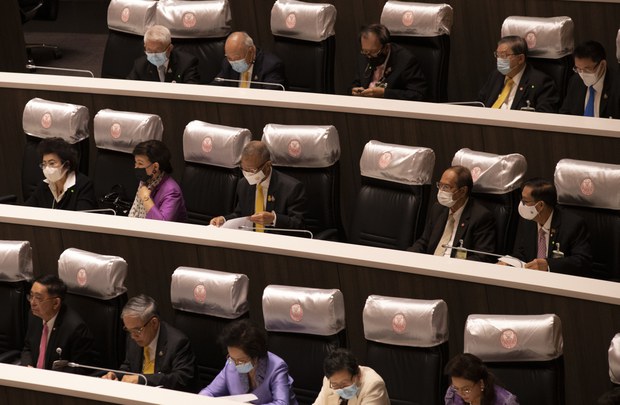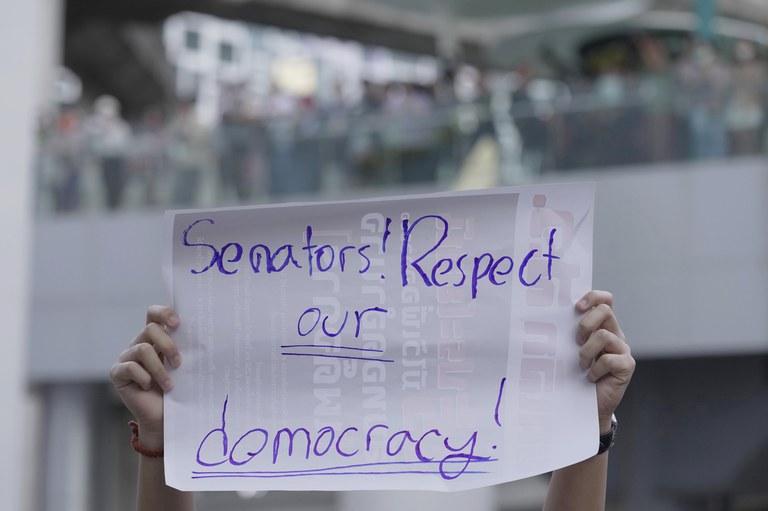Rights activists slam Thai Senate selection process for lacking public participation
2024.05.07
Bangkok
 Thai Senate members attend a joint session of parliament in Bangkok, Nov. 17, 2020.
Thai Senate members attend a joint session of parliament in Bangkok, Nov. 17, 2020.
Human rights activists and academics in Thailand say they are concerned that the upcoming Senate selection process is as undemocratic as the last one when the junta appointed the senators.
They said the new process to replace the 2019 senators, whose five-year term ends May 11, lacks public participation because it limits those who can contest to members of specific professional groups who must be at least 40 years old. And the candidates are not allowed to campaign.
Isa Gharti, a public policy researcher at Chiang Mai University, said the Senate election process in a democracy should be transparent and accountable.
“[S]enators should be directly elected by the people. If only certain groups are given the right, it will be difficult for senators to truly represent the public,” she told BenarNews.
“The election must be open to all citizens, allowing them to directly contest and vote. The process must be simplified.”
Human Rights Watch (HRW) is also among the critics of the new process to select members of the Thai legislature’s upper house, which will now have 200 senators, down from 250.
“The Thai Senate election scheduled for June will not be able to erase the legacy of military rule and will be an obstacle to the restoration of democratic governance,” said Sunai Phasuk, HRW’s senior researcher for Thailand.
Candidate registration is set to begin on May 13 with selections occurring on June 9 at the district level, June 16 at the provincial level, and June 26 at the national level. The selection results are to be announced on July 2.
Senate candidates must be at least 40 years old, and from one of 20 professional groups with at least 10 years of experience in their respective fields. The groups include public administration and security, law and justice, rice farming and field crop cultivation.
Candidates also have to either be born, registered or have previously lived or worked in the district they are contesting from for at least two years, and pay a registration fee of 2,500 baht (U.S. $67.83).
Candidates in each group will vote among themselves at the district, provincial and national levels. The Election Commission (EC) has estimated that 100,000 candidates could register for the 200 Senate seats, according to media reports.
The way it will work is that at the national level, candidates from the professional groups will select candidates for the groups they don’t belong to. Then the top ten of those who were chosen in each of the professional groups will become senators.
Candidates ranked 11th to 15th from each group – 100 of them – will serve as reserve senators.

HRW said that in this so called “intra-group election” system, candidates cast votes among themselves within the same social and professional group.
“For those seeking reform, Thailand’s Senate election is unlikely to bring it,” the rights watchdog said in a statement on May 5.
This is problematic given the Senate’s role in approving independent organizations, although unlike earlier it will no longer have a role in selecting the prime minister, Sunai of HRW said.
“[I]t still holds the right to approve key positions in important agencies such as the Election Commission (EC), the National Anti-Corruption Commission (NACC), and the Constitutional Court judges who play a significant role in dissolving political parties and revoking the rights of MPs,” HRW’s Sunai said.
Thai democracy campaign group ilaw’s Director Yingcheep Atchanont had told BenarNews last week that the outgoing senate members, for instance, voted only those who shared their political views and those who represented their interests
“The Senate also has the power to approve constitutional amendments,” he added, which was crucial at a time when Thailand has begun the process to amend the 2017 Constitution, which was drafted by a junta-backed committee
EC defends process
Yingcheep of iLaw told BenarNews on Tuesday that senators may be even more important than members of parliament.
“Senators are crucial for the nation, especially in advancing the people’s constitution, selecting individuals to serve in organizations that oversee state power and enacting various laws,” he said.
“However, the Senate election law seems to discourage public participation.”
The Election Commission denied that the public will not be able to participate in the Senate selection, when BenarNews contacted it for comment.
Sawang Boonmee, EC secretary-general, on Tuesday said the public participation would be in the form of monitoring and observing the selection process.
“The EC recognizes the importance of public participation. Therefore, the public has the right to follow, inspect and observe the process after the registration closes,” Sawang told BenarNews.
“The EC will publish the names of all Senate candidates on the Smart Vote application and the EC’s website. Senate candidates can contact each other via email or the Line application to introduce themselves.”
Sawang added that according to the EC, this information “is sufficient” for the public and Senate candidates to consider and select candidates among themselves.
He reiterated that Senate candidates are not allowed to campaign and can only introduce themselves and their work experience.
Lawsuit
Meanwhile, a prospective candidate filed a lawsuit on April 29 with the Administrative Court to revoke the EC’s regulations, citing a lack of public participation.
Tewarit Maneechai, managing editor of the Prachatai news site, also said in his petition, set to be heard May 15, that the Senate selection appeared to be a closed-door process.
set to be heard May 15 that the Senate selection regulations appear
“I hope that the process will be amended in accordance with the constitutional intent, which desires that citizens who want to participate in politics are not excluded,” Tewarit told BenarNews.
“If senators continue to come from a selection system that restricts rights, is not open and is dominated by interest groups, we will see growing calls for the abolition of the Senate because it goes against the democratic spirit that power must come from the people.”







